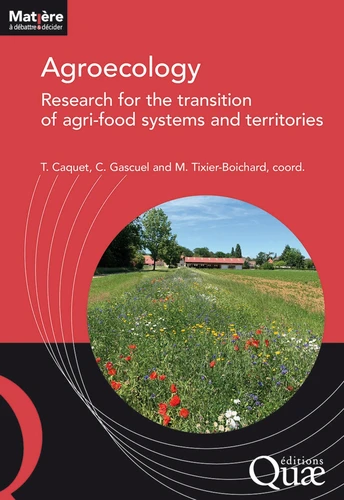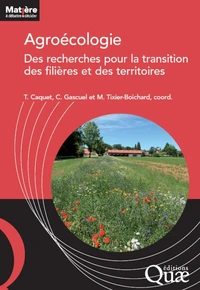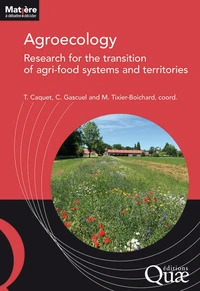- Accueil /
- Chantal Gascuel
Chantal Gascuel

Dernière sortie
Agroecology : research for the transition of agri-food systems and territories
Agroecology was chosen by INRAE as one of its interdisciplinary scientific foresight studies designed to identify research fronts in response to major societal challenges. Eighty researchers drew up an assessment and proposed research avenues for agroecology. This book summarizes their main conclusions. Agroecology, as a scientific discipline that puts ecology back at the centre of agricultural system design, is now well established.
Diversification of living organisms in agroecosystems is a broad objective that is intended to make these systems more robust and resilient. Research in genetics and landscape ecology must be mobilized so that agroecology can use mechanisms from the field to landscape scales. Progress is being made in modelling agroecological systems to better understand the many biotic and abiotic interactions, to predict them, and to begin to manage some of them.
Diversification of living organisms in agricultural production (species, varieties, crop rotations, etc.) leads to more. varied products. The consequences will be significant on the commodity chains, and more precisely on agri-food systems, from production methods to product consumption. These changes are long-term. The agroecological transition, which is adaptive, co-constructed with all actors, is in itself a research subject, and will rely on experimental devices, farms, and 'Territories of innovation'.
Diversification of living organisms in agroecosystems is a broad objective that is intended to make these systems more robust and resilient. Research in genetics and landscape ecology must be mobilized so that agroecology can use mechanisms from the field to landscape scales. Progress is being made in modelling agroecological systems to better understand the many biotic and abiotic interactions, to predict them, and to begin to manage some of them.
Diversification of living organisms in agricultural production (species, varieties, crop rotations, etc.) leads to more. varied products. The consequences will be significant on the commodity chains, and more precisely on agri-food systems, from production methods to product consumption. These changes are long-term. The agroecological transition, which is adaptive, co-constructed with all actors, is in itself a research subject, and will rely on experimental devices, farms, and 'Territories of innovation'.
Agroecology was chosen by INRAE as one of its interdisciplinary scientific foresight studies designed to identify research fronts in response to major societal challenges. Eighty researchers drew up an assessment and proposed research avenues for agroecology. This book summarizes their main conclusions. Agroecology, as a scientific discipline that puts ecology back at the centre of agricultural system design, is now well established.
Diversification of living organisms in agroecosystems is a broad objective that is intended to make these systems more robust and resilient. Research in genetics and landscape ecology must be mobilized so that agroecology can use mechanisms from the field to landscape scales. Progress is being made in modelling agroecological systems to better understand the many biotic and abiotic interactions, to predict them, and to begin to manage some of them.
Diversification of living organisms in agricultural production (species, varieties, crop rotations, etc.) leads to more. varied products. The consequences will be significant on the commodity chains, and more precisely on agri-food systems, from production methods to product consumption. These changes are long-term. The agroecological transition, which is adaptive, co-constructed with all actors, is in itself a research subject, and will rely on experimental devices, farms, and 'Territories of innovation'.
Diversification of living organisms in agroecosystems is a broad objective that is intended to make these systems more robust and resilient. Research in genetics and landscape ecology must be mobilized so that agroecology can use mechanisms from the field to landscape scales. Progress is being made in modelling agroecological systems to better understand the many biotic and abiotic interactions, to predict them, and to begin to manage some of them.
Diversification of living organisms in agricultural production (species, varieties, crop rotations, etc.) leads to more. varied products. The consequences will be significant on the commodity chains, and more precisely on agri-food systems, from production methods to product consumption. These changes are long-term. The agroecological transition, which is adaptive, co-constructed with all actors, is in itself a research subject, and will rely on experimental devices, farms, and 'Territories of innovation'.
Les livres de Chantal Gascuel

Agroécologie. Des recherches pour la transition des filières et des territoires
Thierry Caquet, Chantal Gascuel, Michèle Tixier-Boichard
Grand Format
25,00 €

Agroecology : research for the transition of agri-food systems and territories
Thierry Caquet, Chantal Gascuel, Michèle Tixier-Boichard
E-book
Gratuit

L'eutrophisation. Manifestations, causes, conséquences et prédictibilité
Gilles Pinay, Chantal Gascuel, Alain Ménesguen, Claire Etrillard
E-book
Gratuit

Comment réconcilier agriculture et littoral ?. Vers une agroécologie des territoires
Chantal Gascuel, Laurent Ruiz, Françoise Vertès
E-book
15,99 €

L'eutrophisation. Manifestations, causes, conséquences et prédictibilité
Gilles Pinay, Chantal Gascuel, Alain Ménesguen, Claire Etrillard
Grand Format
29,00 €

Comment réconcilier agriculture et littoral ?. Vers une agroécologie des territoires
Chantal Gascuel, Laurent Ruiz, Françoise Vertès
24,00 €

25,90 €

Agroecology : research for the transition of agri-food systems and territories
Thierry Caquet, Chantal Gascuel, Michèle Tixier-Boichard
Grand Format
25,00 €
